Cohost archives: Games with short stories
September 20, 2024
 Cohost was a very good outlet for quick reviews and recommendations. While I don't feel like I need to drag all that around with me, I wanted to at least collect what I wrote about short narrative games and similar things. Games that tell stories don't have to be like movies, and they don't have to be like novels, either.
Cohost was a very good outlet for quick reviews and recommendations. While I don't feel like I need to drag all that around with me, I wanted to at least collect what I wrote about short narrative games and similar things. Games that tell stories don't have to be like movies, and they don't have to be like novels, either.
Indie kind of evolved into its own area of exploring what a story might mean in a game, how to tell one, how not to tell one but still convey a vague meaning through the poetry of interaction [...] and then the way that can get contrasted against the grand ambition of AAA to “be like Hollywood”.
Nathalie Lawhead, "Games are giant weird story machines! (video games, their stories, and building stories for systems)"
Most beginning writers are [...] unaware of how fragile the desire to know what comes next actually is--or how easily it's subverted.
Samuel Delany, About Writing
The Barnacle Goose Experiment
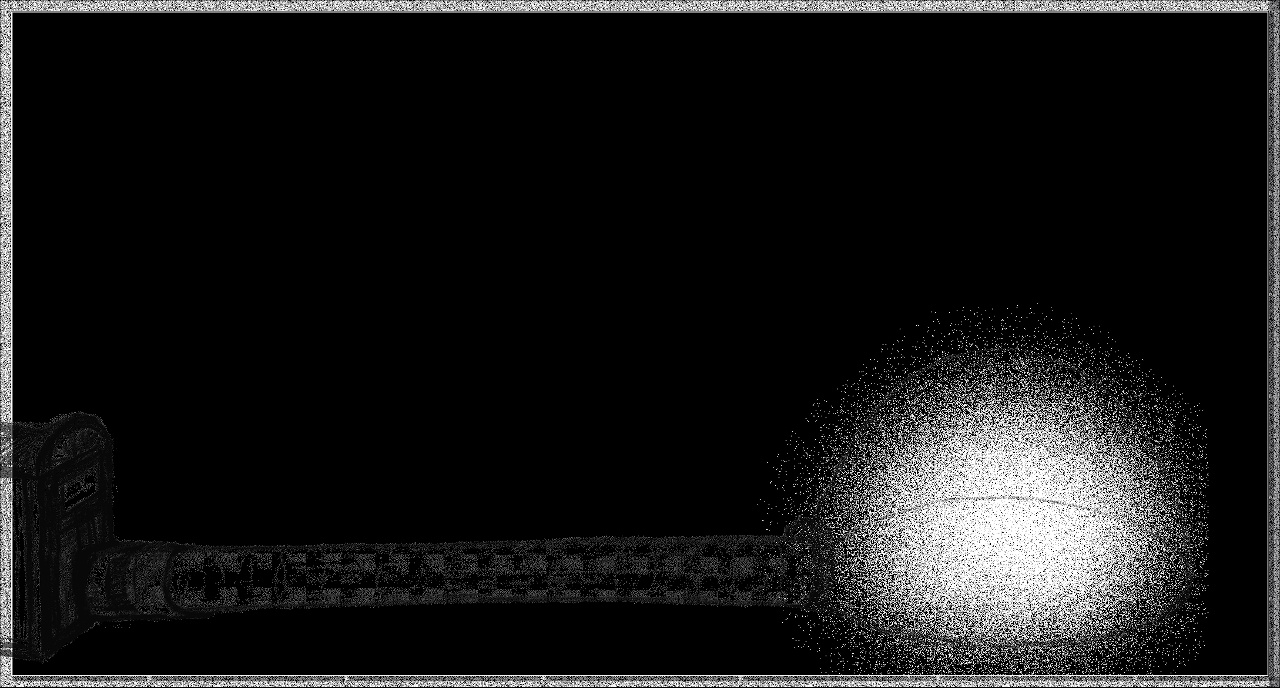
Probably best to go into this knowing as little as possible, but my vague high-level thoughts are:
- I find clicker/idle games to be conceptually sort of bleak and horrible, a blunt demonstration of how people can use systems to do bad things to other people, and this feeling increases the more they cease to be honest about it (e.g., Universal Paperclips) and try to be colorful and welcoming, so horror is a very congruent genre for these things as far as I'm concerned.
- That this game mostly resists the usual gratification loop seems like a big move, since a lot of the dread lives in that loop. But then the numbers you're given at the beginning are either obscured or of uncertain meaning; it feels like wasting resources trying to figure out whether you're wasting resources, which is maybe a more nuanced unease than worrying about making number go up fast enough.
Heaven Will Be Mine
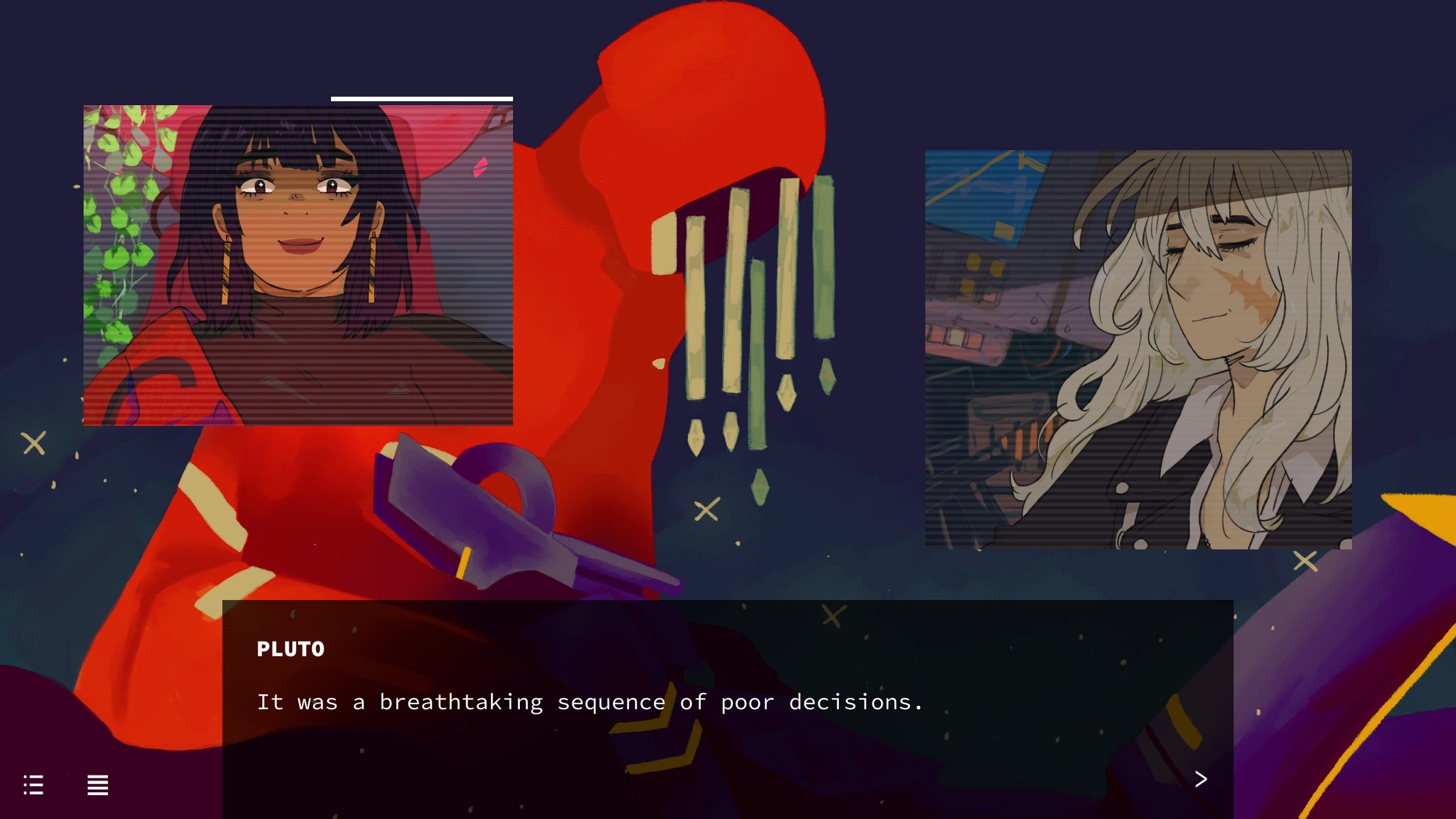
People often sell this game as space lesbian disaster simulator, which is right and good, but it's also a VN with intermission text logs including lines like "The conversion of matter into energy, and energy into culture, and culture back to matter again is complicated by distortions caused by culture's ability to arbitrarily set conversion parameters," and that's the stuff I'm showing up for really.
Umurangi Generation
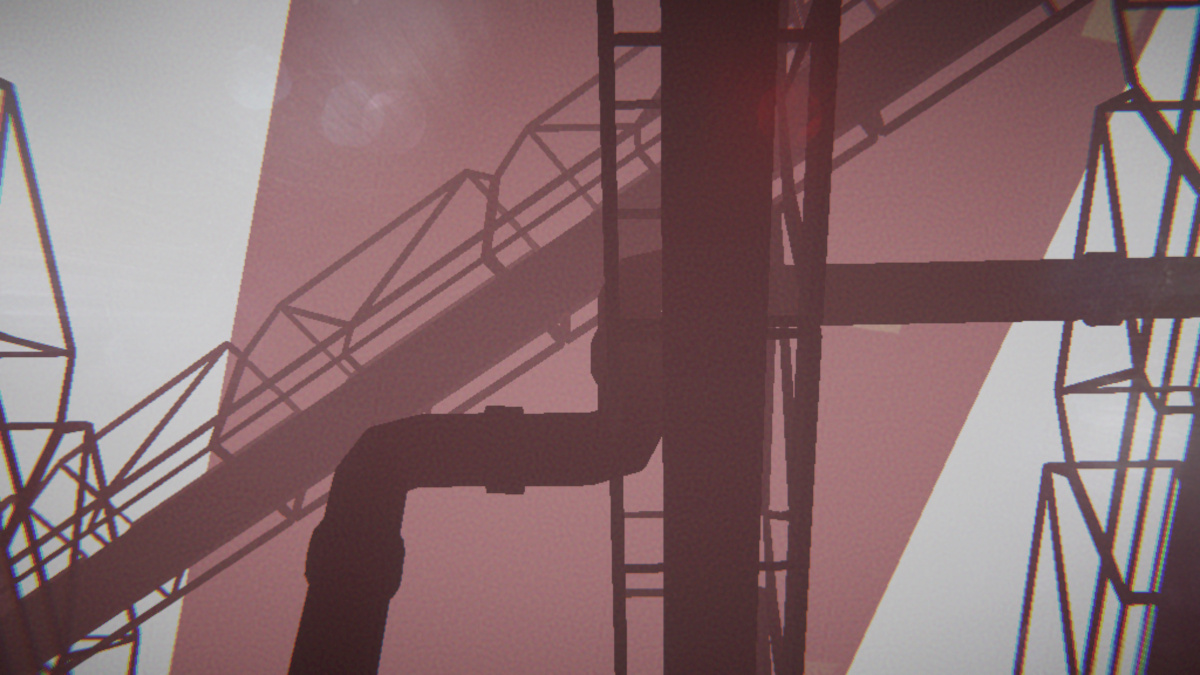
Fundamentally Umurangi Generation is a game in which you take pictures and get Tony Hawk-style trick scores for them. To describe it as "photography at the end of the world" makes it sound more trite than it is--this is very much not a world-ending that the photographer and their friends asked for. Though assuming a science-fictional logic, it's a logical burning-out point of colonialism and western capitalism.
It's a game worth taking your time with. Each level has a time limit, but this is an optional objective, and the tools you're given encourage you to look for shots outside the short list of requirements. Your real goal is to poke around the setting and to witness.
It's angry and funny and specific. The aesthetic is wildly good and the soundtrack is basically perfect--I've spent several times more hours listening to it than playing the game at this point. Umurangi Generation is exactly what cyberpunk should look like, if we insist on dragging that zombie genre with us through the 21st century and want it to mean anything other than regressive retrofuturism (something the cyberpunk granddad himself warned us about in 1981, three years before Neuromancer). It's a hell of a thing and everybody should play it.
H*mest*ck
One of the things that most interests me about Homestuck is how it begins at least comics-adjacent and becomes something more like illustrated fiction that occasionally buries some of its text in a 45-minute game. This is an extension of the things people used to do with webpages, but now that most art activity has moved to social media and sites with specific, limited utility, I wonder where that webpage energy went. I guess we can trace it in a few directions:
- The cultural moment of Twine games happened while Homestuck was being published. It always felt to me like interest in these kinds of hypertext games fell off very quickly, but ...
- ... visual novels are massive in indie spaces now. I don't know that this is a legacy of the early web so much as a result of many more Japanese VNs being localized in the last 10 or 15 years than had been previously, combined with the ease of use of tools like Ren'Py, which gained traction through some high-profile success stories. But VNs are a significant repository of English-language illustrated fiction at this point (and in fact Andrew Hussie is working in the format).
- Games like Hypnospace Outlaw and Subserial Network, and I guess the broad category of "desktop simulators"/"interface dramas" etc., tell their stories by pretending to be old technology. Both games are very good (and like Hussie's MSPA, the creative work of Hypnospace's Jay Tholen has roots in Something Awful forum adventures), but the conceit, fictional websites rather than websites used to host fiction, means they're a half-step removed from what I'm really thinking about here.
- I don't want to overlook Neocities, which is essentially Geocities reimagined as a social network, and also the thing you're technically looking at right now. Neocities has attracted a surprising (to me) number of younger users with ideas about what the online experience can be informed partly by the general state of things now and partly by the look and feel of a web they barely remember, if they remember it at all. A number of webcomics/stories/adjacent things that, format-wise, are pretty directly descended from Homestuck and its fanwork (not to mention, just, straight-up Homestuck fanwork) can be found on people's Neocities sites.
We don't know where this ends because ... it hasn't ended. Maybe some of this energy ends up in text-based adventure/RPGs, your Roadwardens and your Citizens Sleeper. We know it sometimes makes its way into traditionally published fiction--I'm thinking of a former Homestuck fan writer whose novels about space necromancers got very popular a few years ago. And let's be honest with ourselves, 17776 is an elaborate pesterlog.
A Circle of Charity
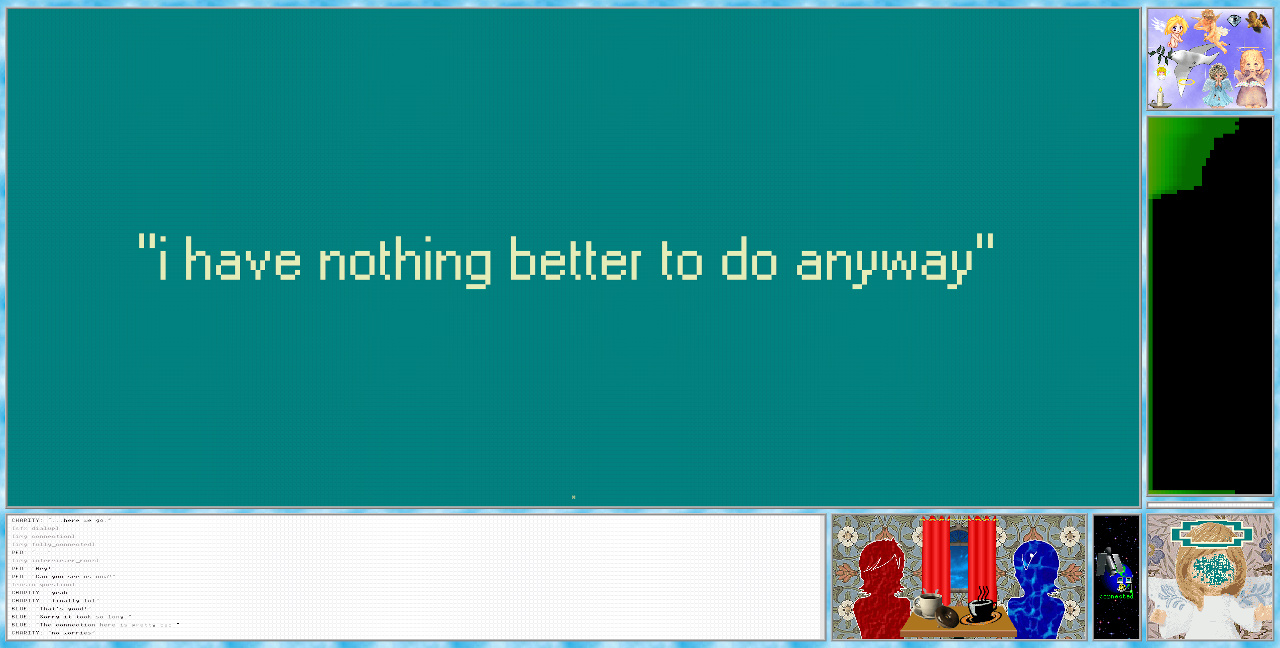
Extremely good. If you haven't played madotsuki's closet by the same dev, you should do that too.
Paradise Killer
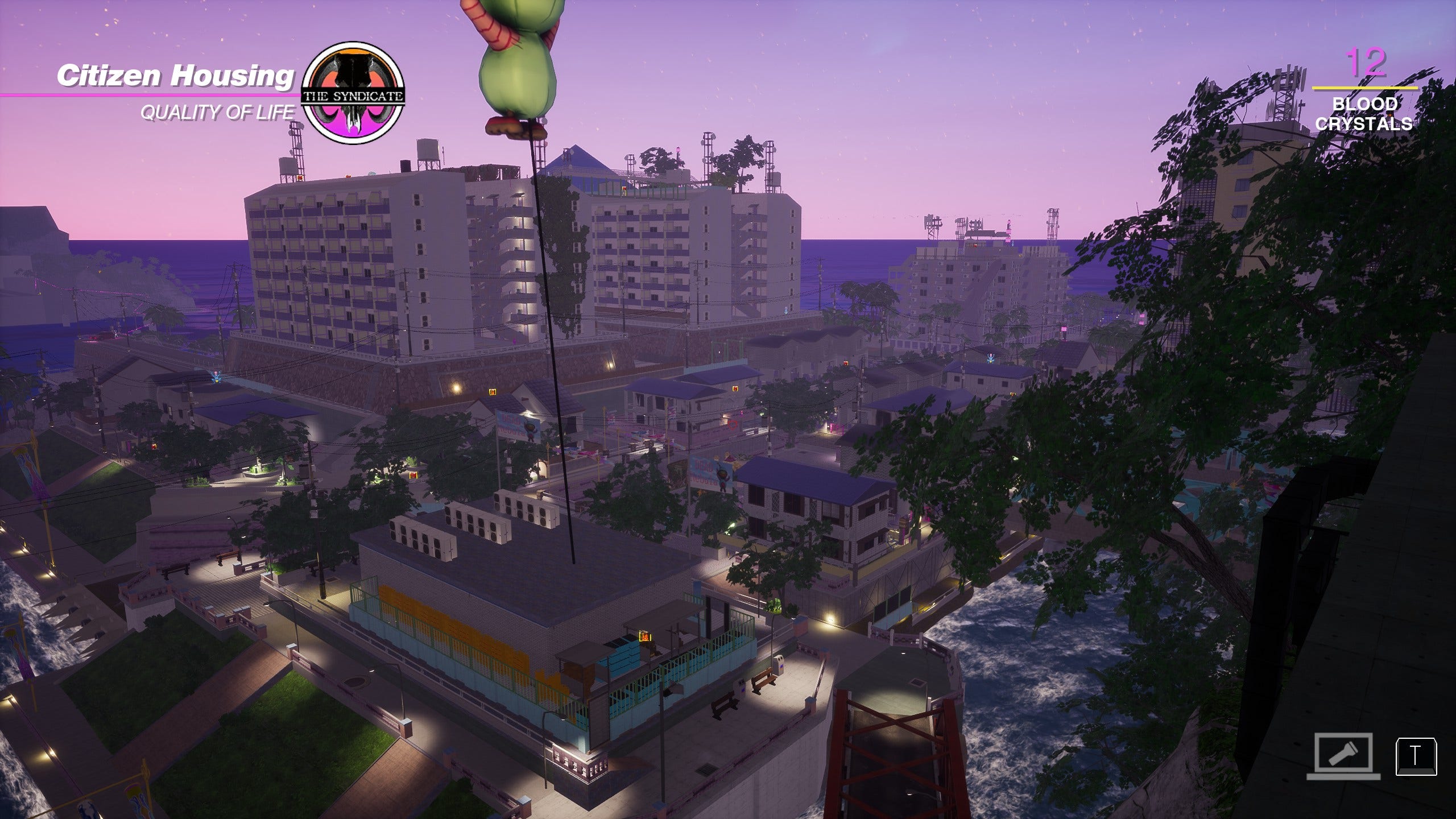
Paradise Killer is a murder mystery first-person point and click-type game, the kind of game that'd be full of FMV if it came out 30 years ago. Calling it a vaporwave nightmare would be redundant because vaporwave is a nightmare, TV snow and cassette hiss polluted by the AIDS genocide and the Moral Majority and the Cold War; vaporwave music is good to the degree that it's busted, mockery rather than just mimicry of the 15 or so years it looks back to. Writer/musician Grafton Tanner, in Babbling Corpse: Vaporwave and the Commodification of Ghosts, called it music that "dissolve[s] the notion of progress" and "sheds new light on history." There's a beach and some palm trees, but the trees are the wrong color and the beach is haunted.
In the case of Paradise Killer the horrors invoked are cosmic, which fits pretty well. It's all about the attempt to construct a perfect and eternal past-present. Maybe needless to say, sacrifices are required.
Enjoy the Diner
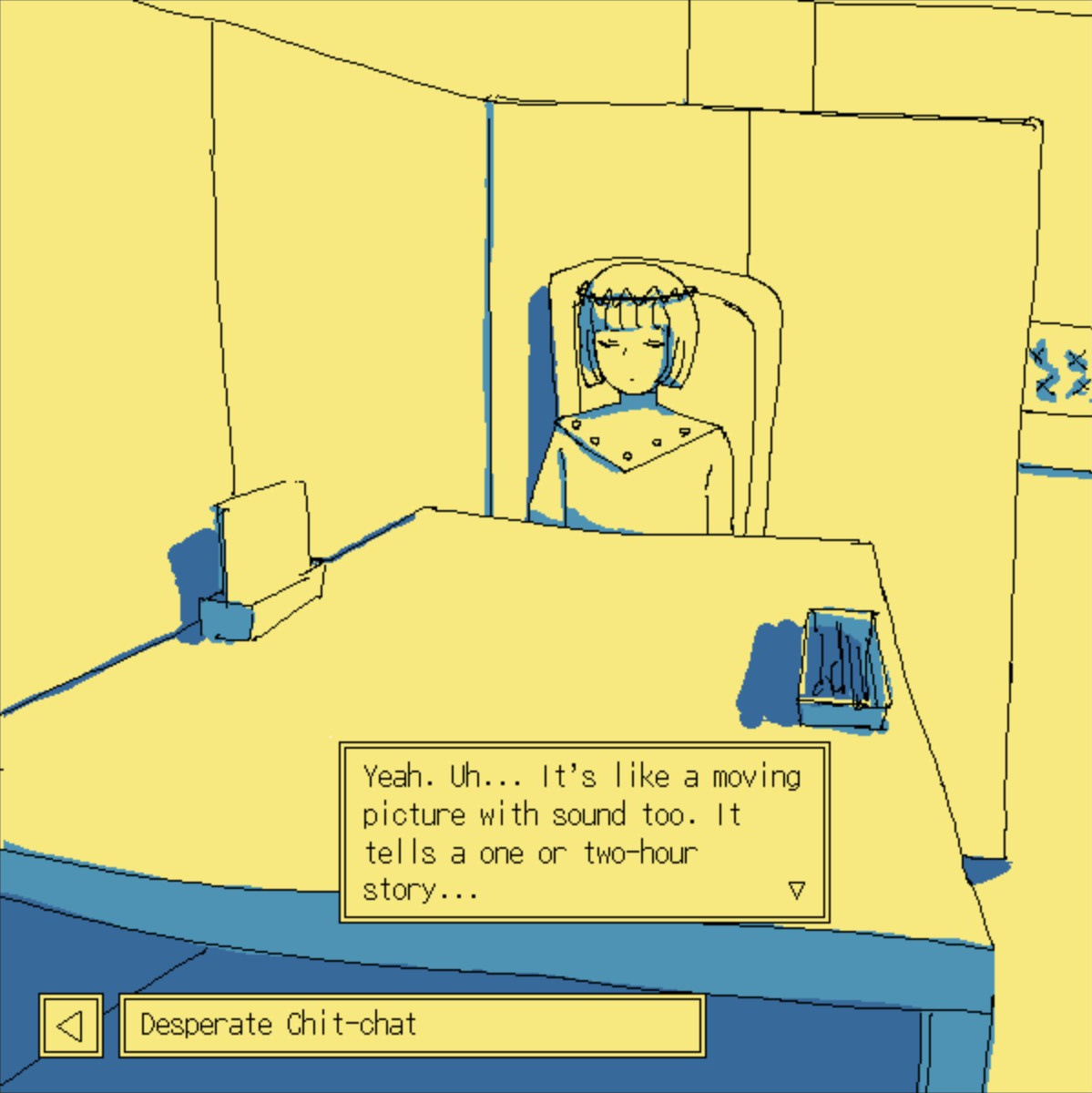
For me a few hours is the right length for a VN because it's about the length I prefer fiction to be in general. Some people are very attached to their million-word epics, and I get it--I used to be, too. But now I'm most interested in what a writer can do in the range between a long short story and 80,000 words or so, given room to breathe but not enough to belabor the point. I'll read series of related stories, but I like it when each has a beginning and ending.
This is all to say that I played Enjoy the Diner, the translated version of this. It took a little over 2 hours, though there's another ending I could get, I think. It's good if you like things like this, which you should know right away; just look at the store page. A little mystery game for people who like tsukumizu and also remember staying up all night with friends at IHOP or your local equivalent, drinking bad coffee until it made you sick.
I don't want to give too much away here, but if you're curious, here's an interview with the developer.
ghostpia
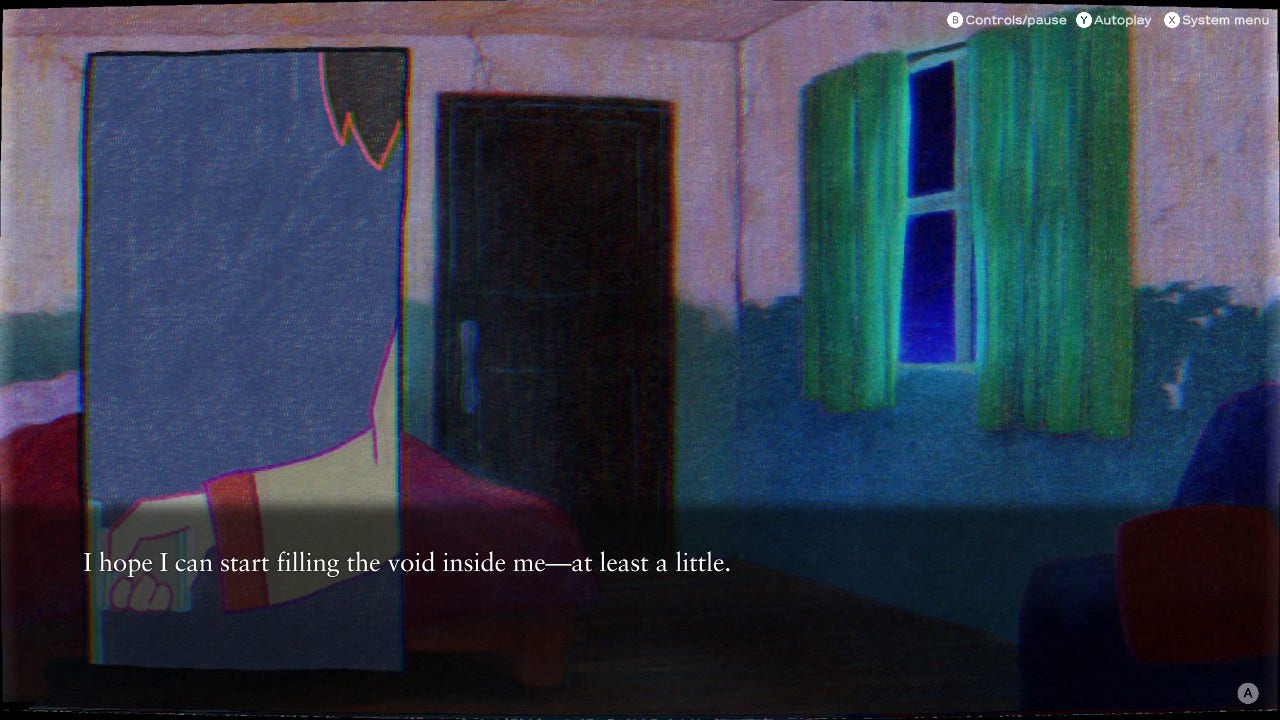
One of the first things you'll notice about ghostpia is the amount of weight pulled by the visual rhetoric. It's the main thing being pitched on the storefronts--"ghostpia's visuals mix warm, delicate art [...] with glitch and noise effects, for a strangely nostalgic visual novel vibe," "enjoy it like you would a good movie," and so on. You certainly could choose to go the other way with a VN, especially one without very much ludo-stuff, and prioritize the novel part over the visual, but if you told me ghostpia was drafted as storyboards first and a script second, I'd believe it. The writing comes across as kind of post hoc, feeling its way toward whatever the imagery's about, which works given that the characters are often trying to make sense of weird situations as they encounter them.
 If this inspires you to look into Haibane Renmei, be aware that it includes episodes dealing with self-harm and alluding to suicide.
If this inspires you to look into Haibane Renmei, be aware that it includes episodes dealing with self-harm and alluding to suicide.
A lot of my recommendations amount to "well, you should know whether you'd like it by looking at it, shrug," but that's not really sufficient in this case (maybe in any case, but what can I say, art is personal and I'm lazy). The mood is incongruous in a specific way. Maybe like a grungier Haibane Renmei by way of absurd gag manga? Do people even still watch Haibane Renmei now that it's old enough to drink? My point is there's a lot of violence and melancholy in ghostpia, but it doesn't often feel grim because it's all very goofy. Sometimes it risks being meaner than the art style and the tone of the writing can sustain, and everyone will have a different threshold for this, but it balances out in the overall arc, a hedgehog's dilemma involving some especially spiny hedgehogs.
Lu
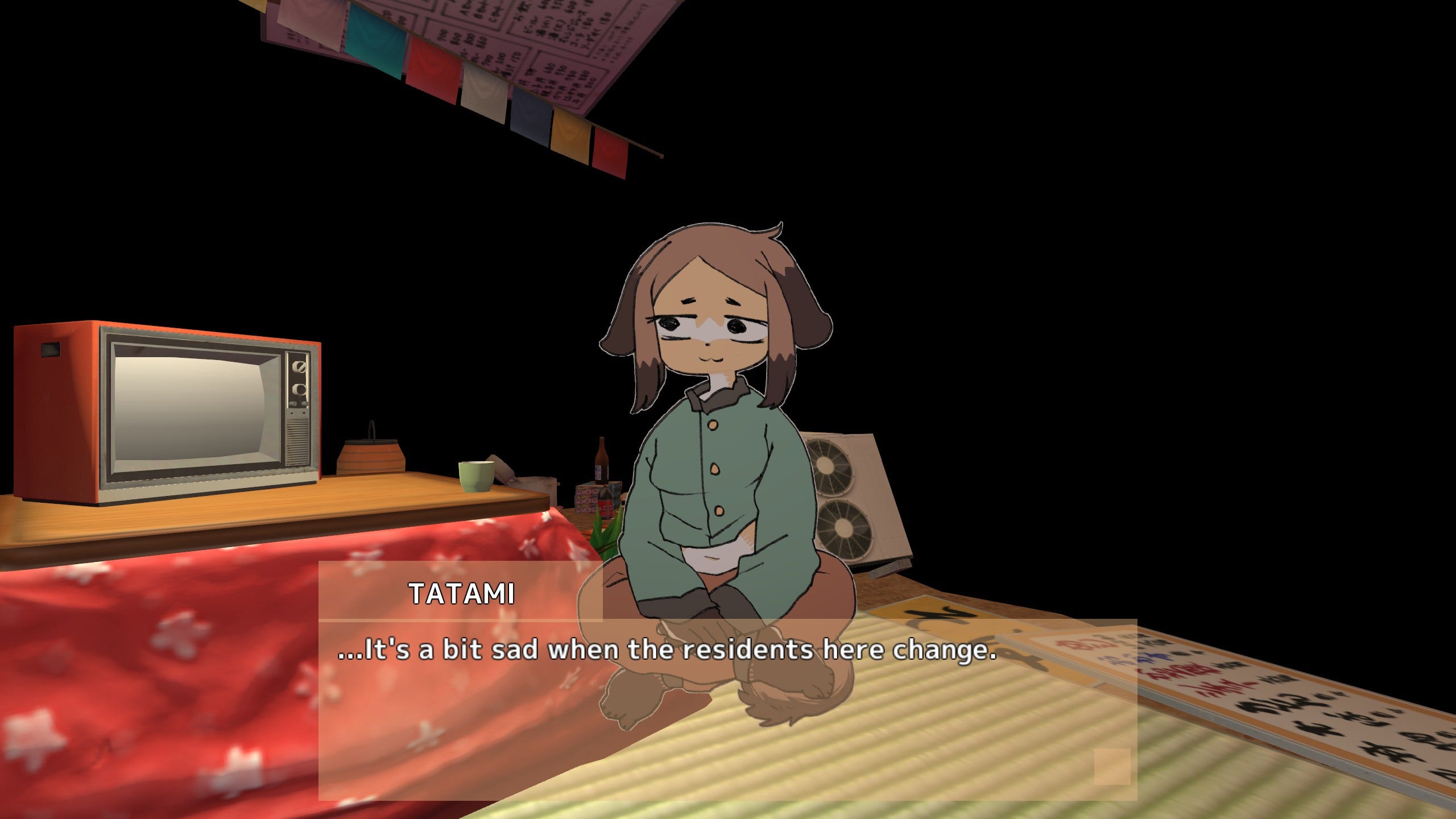
Solo(?) dev Lu makes games driven by an aesthetic that may or may not do it for you. They aren't porn as such, but those animal girls are pretty specific sometimes, is all I'm saying. What they mostly end up being about, though, is people forming micro-communities of various kinds in worlds that aren't made for them, and I just think that's nice.
These are the ones I've most liked:
- I wish it was morning all the time is kind of a turn-based survival horror sim in VN form, which I didn't expect was something I'd be into, but a lot of the design decisions are good ones. Rather than lean on exposition and a verbose UI, it's content to let the visuals pull a lot of weight, to the point that all your status indicators are character and environment details rather than numbers. It's a nice way of taking advantage of the benefits a simple loop--you don't need hard numbers anyway, and omitting them lets you feel like you're figuring things out.
- HOLEHOLE manages to be a game about making games without forcing you to endure an irritating narrator or basically any unfunny asides about tropes or whatever. It's just a straightforward story revolving around one reason why games might matter to someone, building a game world as an extension of the process of carving out space in the "real" world for a relationship.
- MELLOWOLLEM is I guess my favorite of the more vibe-based games, the ones that drop you into a fairly simple science fiction or fantasy premise and mostly leave you to put the pieces together yourself. As the most straightforward of these, it's also the one that least requires you to fight against the controls while looking for things to do. It's, in a way, about collaborating to make the best of a bad situation. Assuming you don't read the POV character as the villain.
- Of course sometimes the little community you fall in with isn't a great one, and DINNERDINNNER is for my money the most interesting take on this because it focuses more on the situation than on Scary Lady Hot. No judgment if you think scary lady is hot, though.
Anthology of the Killer
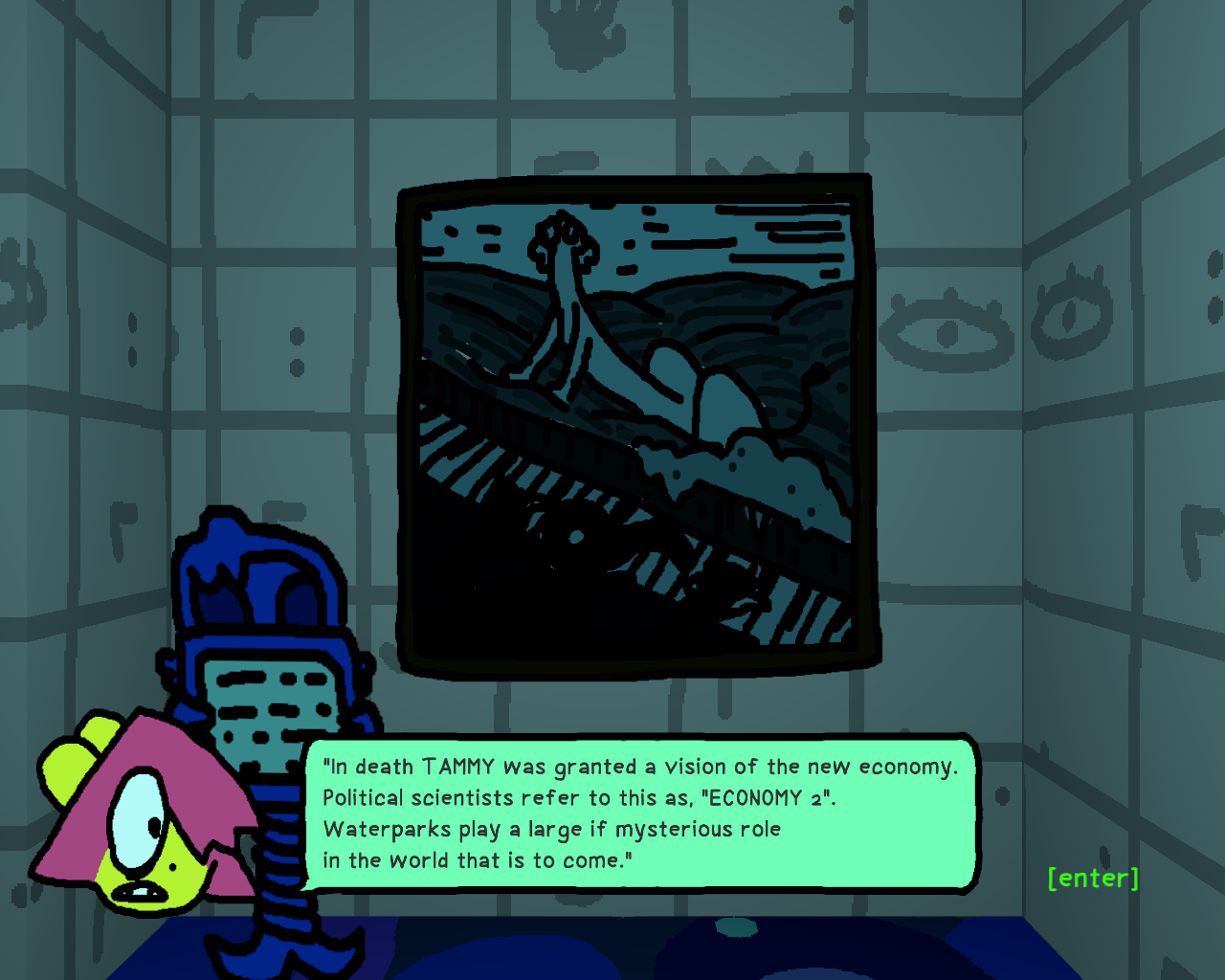
The "of the killer" games by thecatamites are a good way to spend 20 minutes if you feel like laughing uncomfortably.
You probably don't need me to explain the significance of a culture obsessed with killing and dying and haunted by the bad opinions of the dead, but there are a few things I think these games do especially well with that idea. One is nailing the vague feeling of being an unimportant player in a horrible farce, a joke with a lethal punchline. Another is acknowledging that, no matter how critical we are of the culture we're swimming around in, we aren't exempt from it.
HEARTLOVEPOWERTEMPLE
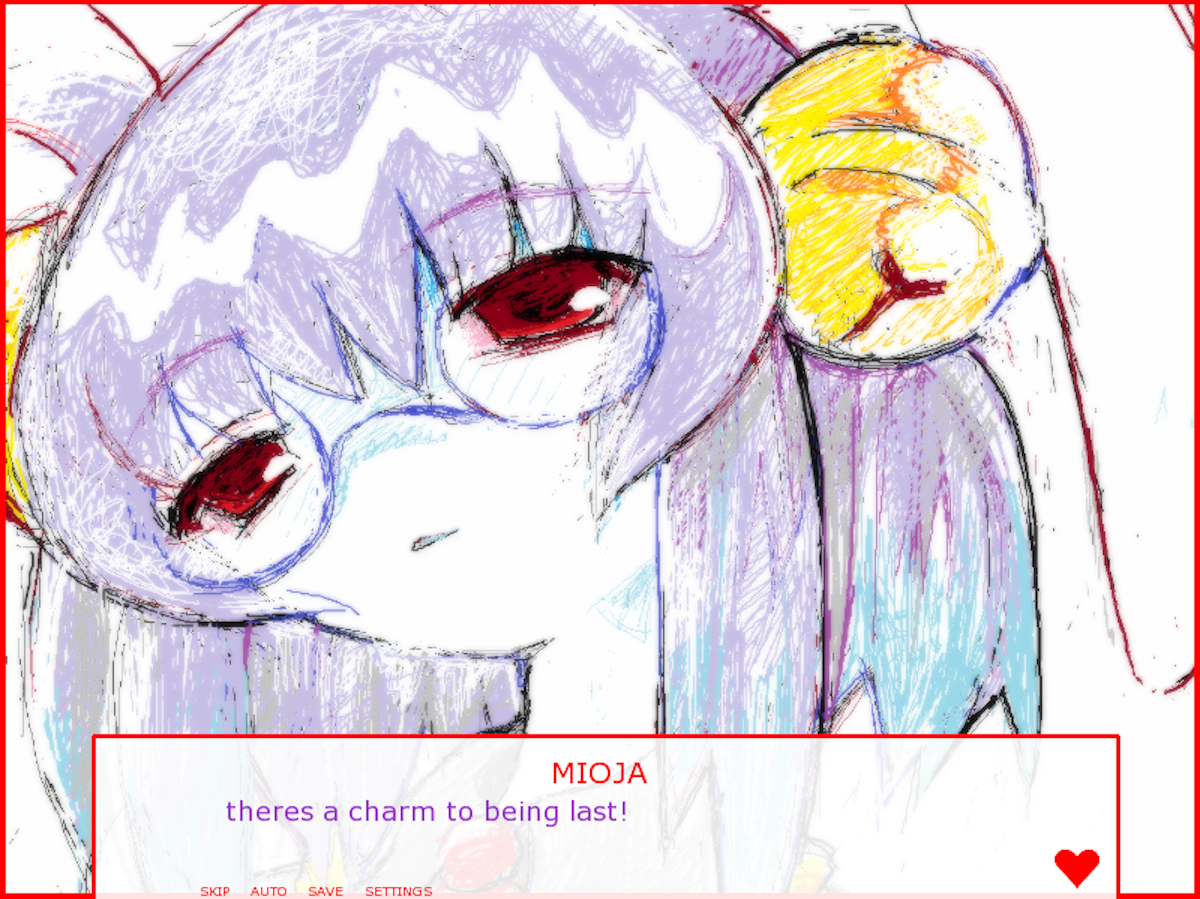
Not sure how to describe this aesthetic ... like a personal webpage in the form of a VN? It's not totally preoccupied with y2k or glitch art, but those things are in the DNA somewhere. Either way I find it really compelling. It's like sincerity pushed to the point of signal breakup.